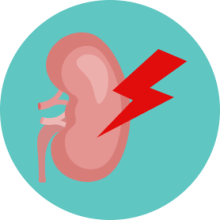Dengue: Lesser known symptoms, complications, and so-called mild infections
The diagnosis and treatment of dengue fever can be complex, and its disease course can be unpredictable. 1,4 This article aims to fill in the gaps and help explain some of the lesser-known details of dengue.
Did you know?
Dengue can cause a wide range of symptoms
Around 4 in 5 people show no or mild symptoms when infected with the dengue virus.2 However, when symptoms do occur, they can be varied because dengue can affect many different organs in the body. Symptoms usually last for 2-7 days. In recent years, unusual clinical symptoms of dengue fever have become more common, yet these presentations are often under-reported.1
As well as the more commonly listed symptoms which you can find here, these are some of the lesser-known symptoms of dengue, noted in between 0.5-21% of people experiencing symptoms:1,3,4

Inflammation of the liver

Diarrhoea

Raised blood pressure

Gallbladder inflammation

Acute respiratory distress syndrome

Acute kidney injury

Seizures

Dizziness and fainting

Eye issues

Increased menstrual bleeding
Dengue can cause aggravation that goes beyond illness.
Dengue illness can result in many unpleasant consequences beyond just getting sick.4 Although around 80% of people show no or mild symptoms,2 dengue infections can result in the need for hospitalisation, daily blood tests, injections, IV fluids, blood transfusions, ultrasound scans and medications.4 Even after the illness has cleared, the road to recovery can be long. Some people have reported profound tiredness, muscle pain and depression for weeks or months after the illness has resolved.4
Dengue symptoms can appear suddenly and without warning.
Severe dengue infections can develop in around 5% of cases.8 When this occurs, people enter what is called the ‘critical phase’, normally about 3-7 days after illness onset. During the 24-48 hours of critical phase, a small portion of people experience sudden deterioration of symptoms. It is at this time that warning signs associated with severe dengue can manifest. Severe dengue is a potentially fatal complication, due to plasma leaking, fluid accumulation, respiratory distress, severe bleeding, or organ impairment.2
Even the ‘mild’ form of dengue can be unpleasant.
Although the mild form of dengue fever experienced by most people is not life-threatening, its symptoms can be extremely debilitating.5 Dengue was once commonly known as ‘breakbone fever’, due to the sudden onset of unbearable headaches and muscle pains often associated with the illness.6 In fact, based on a study in Singapore, it is estimated that around 10% of adult patients who become ill with dengue require prolonged time off work.5 Missed work and hospitalization can result in unexpected financial impact for individuals and their families.7
Even if you have recovered from dengue, you may still be at risk.
You can be infected with dengue more than once2 It’s possible that you had a previous dengue infection, but you did not have symptoms or you thought it was some other illness.2 Even if you had dengue in the past, you are still at risk for a second infection.2 In fact, a second dengue infection can increase your chances of experiencing severe dengue.2
If you are worried about dengue fever or severe dengue, or have any question, please consult a healthcare professional as soon as possible.























































